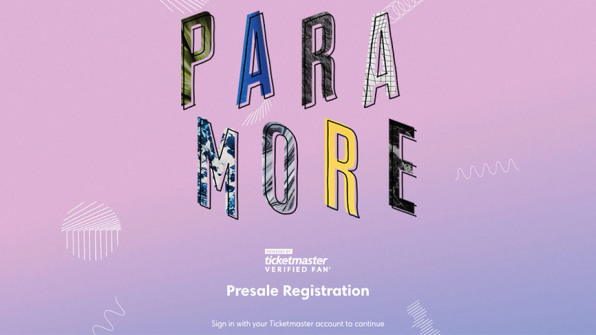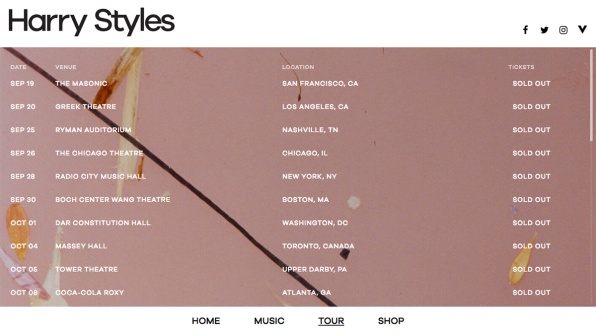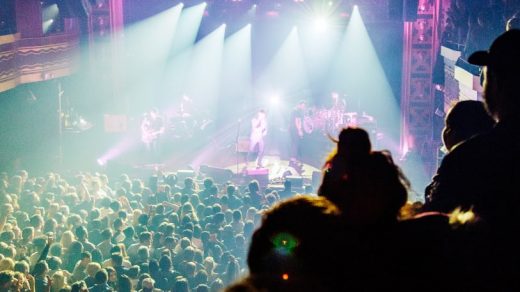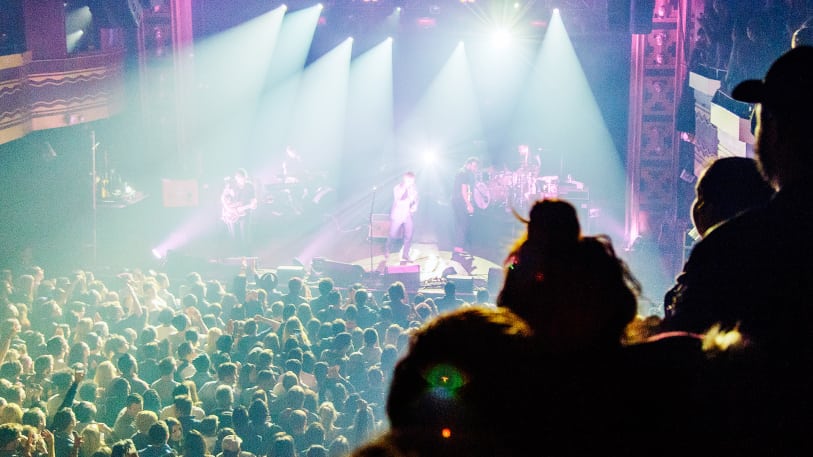Can Ticketmaster’s Anti-Bot Assault Fix Its Most Infuriating Problem?
If you’ve ever tried to buy a concert ticket online, you know the feeling. It’s not easy to describe this rare blend of excitement and anxious dread: Will I score tickets to see one my favorite artists perform live in the flesh? Or will I slam into a virtual brick wall and, despite my stealthiest effort, stumble away empty-handed?
Ticketmaster knows how frustrating this experience can be and the Live Nation-owned company is desperate to find a fix. Verified Fan is an initiative launched by the ticketing giant earlier this year and is designed to thwart automated scalpers and put more tickets into the hands of actual fans. The results have been decidedly mixed, but it’s still early in Ticketmaster’s quest to solve an entrenched problem that is not just annoying for consumers–it’s expensive too.
“To some extent, the problem we’re solving is a problem of our own making,” says David Marcus, Ticketmaster’s executive vice president of music. “That problem is that we–both Ticketmaster and the industry–have for as long as we’ve been selling tickets, been selling tickets to consumers based on speed. You have a good that’s perpetually priced under market in a sales environment that rewards speed.”
This focus on timeliness has left the door wide open for ticket scalpers to devise software-based ways to compete with consumers when tickets go on sale. Tickets to see megastars like Adele, U2, and Harry Styles frequently sell out in mere seconds, only to show up on secondary websites like StubHub and SeatGeek with much bigger price tags–often thousands of dollars per seat. The use of these bots–capable of quickly snatching up tickets in bulk–is so widespread that former President Barack Obama signed a law called the Better Online Ticket Sales (BOTS) Act late last year banning the practice and making the auto-scalped tickets themselves effectively illegal under U.S. law.
Outlawing a behavior doesn’t necessarily lead to eliminating it. This is a reality the music industry knows all too well from a painful 15 years of illegal file-sharing. That’s why Ticketmaster started the Verified Fan program to speed us along toward a solution to ticket scalping bots. It’s something that, as the industry’s biggest primary ticket seller, it should have started doing years ago.
It’s not as though Ticketmaster hasn’t been trying. Scalping has intensified in recent years as a result of the convenience, speed, and easy exploitability of the internet. The company has invested heavily, Marcus says, in manpower and technology designed to thwart scalpers and bots, but as nearly any diehard Adele fan can attest, those efforts have not gone far enough.

How “Verified Fan” Status Works
“Verified Fan looks at the problem a different way,” says Marcus. “Instead of using technology to fight technology, why don’t we just change the game? Why don’t we take speed out of the equation and not make it about when somebody arrives at the front of the line, but more about who somebody is?”
The logic is simple: Verified Fan requires people to pre-register with their Ticketmaster account and request to be included in the sale ahead of time. Ticketmaster’s system uses its own proprietary algorithm–in concert with intel like past ticket purchases and social media data–to verify the identity and level of fandom of each person.
If approved, fans will receive a text message with a verification code (another step that confirms that you’re real) and an invite to buy tickets just before they go on sale. The process, complex as it may sound, is designed to throw up minor hurdles that only an ardent fan can overcome, in theory. Since the tickets are purchased by invitation, the usual swarm of bots is simply not there to spoil the fun. But even for this smaller mob of legit fans, it’s still a first come, first served race to snag a limited number of tickets.
The program has verified 1.5 million fans so far to sell tickets to more than 30 tours for acts like Mumford & Sons and Ed Sheeran. And the results are impressive. Overall, Ticketmaster reports a 90% reduction in the number of tickets sold on secondary sites when they’re sold through Verified Fan. A pair of arena shows on a recent hometown tour for Twenty-One Pilots in Columbus, Ohio, saw only 4% of their tickets wind up on secondary market ticketing sites. On the same five-venue mini-tour of Columbus, the band sold tickets to smaller venues like a small club and a two thousand seat theater–and saw virtually no scalping take place.
“In a high demand show like that, it wouldn’t be uncommon to see 30% to 50% of the tickets end up on secondary market,” Marcus says. “It’s accomplishing our goals and we’re surprised at how successful it’s been.”
To date, the feature has mostly been used for pre-sale campaigns in which a fraction of tickets is made available to fans before they’re sold to the general public. More recently, the company began expanding Verified Fan beyond the pre-sale stage, using it to sell all tickets to the general public for Harry Styles’s upcoming solo tour.

Lessons For The Future
The program hasn’t been without hiccups. Many fans of Harry Styles turned up empty-handed when the singer’s much-anticipated tour went on sale earlier this month and their verification codes didn’t work. Others simply struggled to beat out the flesh-and-blood competition for tickets. Of course, extremely high demand for a show is an obstacle that no system can easily bypass, with or without bots present. As expected, the social media response among Styles diehards was loud and fierce. In response, Ticketmaster issued an open letter to fans, clarifying that high demand was to blame and assuring Styles devotees that 95% of tickets went to fans, rather than bots. Styles’s management also asked Ticketmaster to review each purchase to ensure fairness and cancel any tickets that were purchased in violation of the rules. This was likely of little solace to some fans, frustrated at their inability to buy a ticket and cringing as they watched seats pop up on high-priced secondary sites.
Whatever may have happened with the Styles tour sale, the experience illustrated a challenge that Marcus already knew they had: Educating consumers. While Ticketmaster’s fan authentication tactics help keep the bots out, they also add a new layer of complexity and uncertainty to the experience of buying a ticket. Getting consumers comfortable with a change in an established process like this will undoubtedly take time–not to mention effort on Ticketmaster’s part.
“This is a huge paradigm shift,” Marcus says. “We have to get better at distributing the tickets and setting expectations around that.”
By necessity, the process is an evolutionary one. “Each tour, we push the envelope a little bit,” says Marcus. “We learn a little bit. And consumers learn a little bit. We’re only as a good as the last one.”
It’s a battle that Ticketmaster can’t fight alone, even if it is on the front lines. Smaller players like Eventbrite–which recently sold tickets to the Newport Folk Festival headlined by Fleet Foxes–have employed their own solutions to the scalping problem. Eventbrite uses its own on-site authentication to thwart scalpers during the purchasing process, combined with an integration with the fan-to-fan ticket exchange service Lyte to ensure secondary ticket sales are done fairly.
Artists apparently have a role to play too. Frustrated by rampant ticket scalping, country singer Eric Church recently canceled 25,000 tickets that were purchased by scalpers and then made those seats available to fans. Some people in the industry advocate raising the price of tickets in the first place to cut down on scalpers, but many managers and artists, like Church, are hesitant to exclude fans with an economic hurdle.
Streaming services might be able to help as well. Platforms like Tidal and Pandora have already experimented with concert ticket pre-sales (notably, Pandora now owns ticket seller TicketFly, which sells tickets to smaller and medium-sized shows). Spotify has been building out its own Fans First program, which offers pre-sale tickets (among other perks) to listeners who stream an artist the most. Spotify already partners with Ticketmaster for concert listing data, but a deeper integration between the two companies could help with the scalping problem by using streaming data to verify loyal fans in a more frictionless manner.
Verified Fan is still quite young and has plenty of directions in which to potentially grow. One possibility Marcus foresees is that the program could evolve into a more fully featured loyalty program that rewards fans in innovative ways. Ticketmaster’s own database of live event ticket purchasers is a pretty significant asset that can go a long way toward enabling something like that. And even in its limited, early rollout, Verified Fan has begun generating valuable data of its own.
“Getting demand data in advance is something that the concert promoters have never had,” says Marcus. “Knowing how many Harry Styles fans that want to buy tickets there are in every market before you ever put a ticket on sale has really interesting effects in terms of the way tickets get priced.”
If nothing else, maybe Harry Styles will book some extra shows the next time around.
“Verified Fan” fights scalper bots to make those Harry Styles tickets easier to snag—but there’s still room for improvement.
If you’ve ever tried to buy a concert ticket online, you know the feeling. It’s not easy to describe this rare blend of excitement and anxious dread: Will I score tickets to see one my favorite artists perform live in the flesh? Or will I slam into a virtual brick wall and, despite my stealthiest effort, stumble away empty-handed?
Fast Company , Read Full Story
(118)














